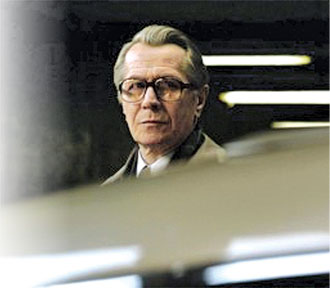|
Tinker, Tailor, Soldier, Spy:
Jags and consciences
By Dr. Binoy Kampmark
Oh what an atmospherically pent up effort – permanent stuffy
darkness; grimy, dirty London immune to light, a world of grubby morals
and even grubbier characters. But John le Carré was always rather good
at charting pathways into dimly lit corridors, giving life to a world
where the economy of morals was always scarce.
 Director Tomas Alfredson’s adaptation of Tinker, Tailor, Soldier, Spy
is a fabulous effort to recapture that dimness, a close study of human
decline and fall. Director Tomas Alfredson’s adaptation of Tinker, Tailor, Soldier, Spy
is a fabulous effort to recapture that dimness, a close study of human
decline and fall.
The language of Tinker, Tailor, Soldier, Spy is the language of the
British public school set, the jousting, the rivalries, the hard played
and fought grand game by mummified bureaucrats. ‘Control’ (John Hurt)
senses there is a rotten apple in the barrel of the Circus (call it MI6,
call it an Oxbridge Senior Common Room), a mole that is passing secrets
on to the invisible, menacing KGB agent in the form of Karla.
Karla, whose face is never seen; Karla, scourge of the British
intelligence system. Such rot was itself an affront – for Control had
few likes. As George Smiley (Gary Oldman), his loyal deputy and flawed
hero explained, ‘He hated everywhere except Surrey, the Circus, and
Lords cricket ground.’
Control’s fears are deemed to be the workings of an addled mind after
his agent, Jim Prideaux (Mark Strong), is betrayed on a mission to
Budapest (in the book, it’s not Hungary but Czechoslovakia) to receive
information about the mole from a Hungarian general who wants to defect.
The critical scene conveys stunning discomfort – the sweat from the
waiter’s brow as it splashes on the coffee table, the sense that the
quarry is about to be nabbed. Betrayal does have such a stench about it.
Prideaux is wounded, tortured and broken. Damaged, he is despatched
home, and home is a replica, if not a pale one of Circus life – a
boarding school. Discredited, Smiley and Control leave the Circus.
Control suffers a heart attack; Smiley is recalled by to straighten
out the mess, albeit from the sidelines. The possible candidates: Haydon
(Colin Firth); Estherhase (David Dencik); Bland (Ciarán Hinds), Alleline
(Toby Jones). Oldman’s Smiley, however well played, is not quite on the
mark with Le Carré’s depiction. ‘Small, podgy and at best middle-age, he
was by appearance one of London’s meek who do not inherit the earth. His
legs were short, his gait anything but agile, his dress costly,
ill-fitting and extremely wet.’ Oldman, by contrast, is taut,
exercising, keeping fit, a different proposition and far from meek. The
damage, rather, is invisible, emotional assaults that have now petrified
over time. The film gathers force in the display of dark atmospherics.
It is a triumph of the understatement – understated yet devastating
treachery; understated betrayals in love and duty; understated
commitments to missions that will destroy lives.
 The characters are controlled, their emotions tightly woven. These
are characters who have dissolved inwardly – Smiley’s sense of betrayal
at the hands of his wife Anne with work colleague Haydon (Colin Firth);
his request that Peter Guillam (Benedict Cumberbatch) ‘tidy up’, which
involves asking his lover to leave; Ricki Tarr (Tom Hardy) waiting for a
woman (Svetlana Khodchenkova) who will never arrive, given that she has
been compromised by Moscow Centre. The characters are controlled, their emotions tightly woven. These
are characters who have dissolved inwardly – Smiley’s sense of betrayal
at the hands of his wife Anne with work colleague Haydon (Colin Firth);
his request that Peter Guillam (Benedict Cumberbatch) ‘tidy up’, which
involves asking his lover to leave; Ricki Tarr (Tom Hardy) waiting for a
woman (Svetlana Khodchenkova) who will never arrive, given that she has
been compromised by Moscow Centre.
In a broader sense, British intelligence could have said to have
dissolved internally, certainly after the discovery of the Cambridge
spies. MI6 was never the same after Kim Philby was unmasked.
Le Carré has been gushing about this production, writing that few
novelists could claim to have one of their books depicted in a way ‘that
has its own life and truth’ (Salon, December 9, 2011). That said, the
film might have done with a few more pickings from the novel, though the
two hour effort was still heroic. The seven part instalment from 1979
featuring the inimitable figure of Alec Guinness as Smiley is pure 1970s
drama, a brilliant period piece.
Roy Bland’s remarks also made an appearance there, a beautiful
statement of managed hypocrisy. ‘As a good socialist, I’m going where
the money is, and as a good capitalist, I’m sticking with the
revolution, because if you can’t beat it spy on it.’
The perfect rounder to the study of thin morals is offered by Bland
himself – ‘you scratch my conscience, I’ll drive your Jag.’
Binoy Kampmark was a Commonwealth Scholar at Selwyn College,
Cambridge. He lectures at RMIT University, Melbourne.
Email: [email protected]
|

